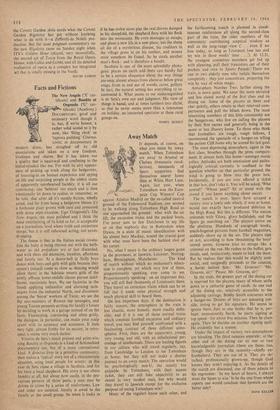Facts and Fictions
The New Angels CX' cer-
tificate) and Bandits at Orgosolo ('U' cer- tificate). (Academy.) DOCUMENTARY, good and necessary word though it is, has, if we're honest, a rather solid sound to it by now, like 'filing clerk' or 'tapioca pudding.' Cinema- verite, or documentary in modern dress, has sloughed off its old associations and taken on a new freedom, liveliness and charm. But it has taken too a quality that is equivocal and confusing to the literal-minded like me. For with its airy appear- ance of picking up truth along the hedgerows, of listening-in on human experience and spying on life and surprising people in the oddest states of apparently unrehearsed lucidity, it is all too convincing; one 'believes' too much and is then emotionally let down to realise, or remember, or be told, that after all it's mostly fiction, wholly acted, and far from being a hedgerow bloom it's a hothouse plant grown with care' and presented with acute sophistication. Ugo Gregoretti's The New Angels, the most polished and 1 think the most entertaining of its kind so far, is acceptable on a journalistic level where truth and conjecture merge, 'but it is still rehearsed acting, not eaves- dropping.
The theme is that in the Italian social revolu- tion the baby is being thrown out with the bath- water as old prejudices are at last disCarded, and with them old decencies, loyalties, affections and family ties. At a dance-hall in Sicily boys dance with boys and girls with girls because they mustn't (mixed) come as close as dancing would allow them; in the Adriatic resorts girls of the newly affluent lower-middle classes pursue indif- ferent, narcissistic boys. We see factories in the South applying unfamiliar and alarming tech- niques from the industrial North, and discontent among the 'boom' workers of Turin; we see the flip anti-manners of Roman top teenagers, and young Tuscan peasants settling the family's future by deciding to work in a garage instead of on the farm. Fascinating, convincing and often grisly, the dialogue, in particular, can make your scalp crawl with its accuracy and acuteness. It feels very light, almost frothy for its matter; in retro- spect it seems very much darker.
Vittorio de Seta's much praised and prize-win- ning Bandits at Orgosolo is a kind of fictionalised documentary too, but of a more conventional kind. A director lives in a primitive community, then makes a 'typical' story out of a characteristic situation, using local people for actors: in this case de Seta chose a village in Sardinia, and for his hero a local shepherd. His story is not about bandits at all, but about how easily, in the pre- carious poverty of those parts, a man may be driven to crime by a series of misfortunes. Law and order are inimical, loyalty is owed to the family or the small group. So when it looks as if he has stolen some pigs the real thieves dumped in his sheepfold, the shepherd flees with his flock into the mountains. He even manages to escape, and plans a new life in a new place; but the sheep all die of a mysterious disease, his creditors in the village press in on his mother, and money must somehow be found. So he steals another man's flock : and is therefore a bandit.
Sardinia is one of the most splendidly photo- genic places on earth and there can hardly fail to be a certain eloquence about the way things are seen, almost always from above or below great crags, from in and out of woods, caves, gulleys. In fact, the natural setting has everything to re- commend it. What seems to me undistinguished is de Seta's own eye and judgment. His view of things is banal, and at times lumbers into clichd, so that he never seems more than a townsman on holiday, an interested spectator at these rural goings-on.
ISABEL QUIGLY


































 Previous page
Previous page